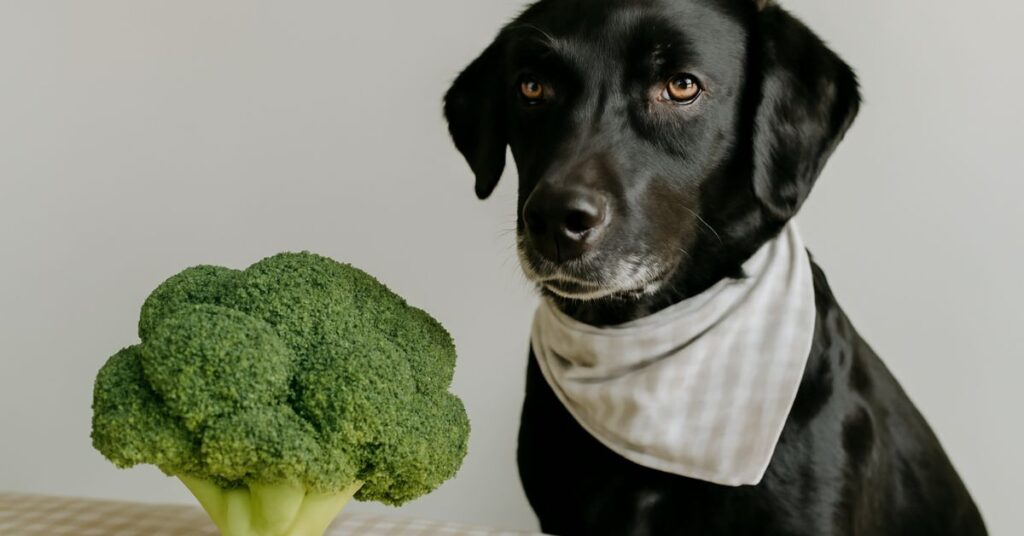Can dogs eat broccoli? As a dog owner, it’s natural to want to feed your furry friend healthy and nutritious snacks. Broccoli is a vegetable known for its health benefits to humans, but how does it fare when it comes to our canine companions? The good news is that dogs can eat broccoli, and it can even provide several nutritional benefits. However, like with all treats, it’s important to serve it properly and in moderation.
In this guide, you will find everything you need to know about feeding broccoli to your dog. We will explore the health benefits of broccoli, how to serve it, portion sizes, and any potential risks. From its high vitamin content to its potential to improve digestion, broccoli can be a great addition to your dog’s diet. However, it’s essential to understand the right ways to prepare and serve it to avoid any health complications.
By the end of this guide, you’ll have all the information you need to safely incorporate broccoli into your dog’s diet without overdoing it.
Can Dogs Eat Broccoli?
Yes, dogs can eat broccoli, and it can be a healthy treat for them when fed properly. Broccoli is packed with essential nutrients like vitamins, fiber, and antioxidants, which are beneficial for your dog’s health. That being said, it’s crucial to ensure that broccoli is fed in moderation

Both raw and cooked broccoli are safe for dogs, but overfeeding broccoli can cause digestive issues such as gas, bloating, or diarrhea. Broccoli contains isothiocyanates, compounds that can irritate your dog’s stomach if consumed in large quantities. Therefore, it’s crucial to follow the 10% treat rule—meaning that treats, including broccoli, should not exceed 10% of your dog’s daily caloric intake.
When served in small, controlled portions, broccoli can provide many health benefits without causing harm.
Health Benefits of Broccoli for Dogs
Broccoli is not only safe for dogs but also offers several health benefits. It’s rich in various vitamins and minerals that can promote your dog’s overall well-being. Here’s a detailed look at its nutritional profile and specific health benefits:
Nutritional Profile of Broccoli
- Vitamin C: Supports your dog’s immune system and helps fight infections.
- Vitamin K: Crucial for bone health and proper blood clotting.
- Fiber: Promotes healthy digestion and regulates bowel movements.
- Antioxidants: Help fight inflammation and support overall health.
- Low-Calorie: Great for dogs that are overweight or need to maintain a healthy weight.
Specific Health Benefits
- Immune Function Support: The vitamin C in broccoli helps boost your dog’s immunity and fight off common illnesses.
- Digestive Health: The fiber content in broccoli aids digestion and keeps things running smoothly in your dog’s digestive system.
- Bone Health: Vitamin K helps maintain strong bones and supports the bone-building process.
- Anti-inflammatory Effects: The antioxidants and anti-inflammatory compounds in broccoli may help reduce inflammation in joints, especially for senior dogs.
- Dental Health: Chewing raw broccoli can help remove plaque buildup, promoting healthy teeth.
Broccoli can contribute positively to your dog’s diet by offering a healthy, low-calorie treat that’s rich in essential nutrients. However, it’s important to serve it in moderation to avoid any adverse effects.
Different Forms of Broccoli and How to Feed It to Your Dog
Broccoli can be fed to your dog in various forms—raw, cooked, and even frozen. Let’s take a look at the different ways you can incorporate broccoli into your dog’s meals:
Can Dogs Eat Raw Broccoli?

Yes, raw broccoli is safe for dogs and retains the most nutrients. Nevertheless, there are some important considerations to keep in mind:
- Wash thoroughly to remove any pesticides or bacteria.
- Cut into small pieces to avoid choking hazards, especially for small dogs.
- Raw broccoli is best for dogs with strong teeth, as it can be tougher to chew.
Can Dogs Eat Cooked Broccoli?
Cooked broccoli is also safe for dogs and may be easier for some dogs to digest. When cooking broccoli for your dog:
- Steam or boil without any oil, butter, or seasoning.
- Steaming is the best method as it preserves most of the nutrients.
- Avoid boiling, as it may cause nutrient loss.
Can Dogs Eat Broccoli Stems and Stalks?
While broccoli stems and stalks are technically safe, they pose a choking hazard. It’s better to stick with the florets, or if you choose to feed the stems, cut them into very small pieces. Always supervise your dog while they’re eating broccoli.
Can Dogs Eat Frozen Broccoli?
Frozen broccoli is safe for dogs and can be a fun, refreshing treat. It’s also great for cleaning your dog’s teeth if they have healthy teeth. However:
- Thaw the broccoli slightly to prevent tooth damage.
- Avoid frozen broccoli for dogs with dental problems, as it can be too hard for them.
How Much Broccoli Can Dogs Eat?
It’s important to feed your dog the right portion of broccoli. Overfeeding broccoli can lead to digestive upset and other issues. Here’s how much broccoli you can safely feed your dog based on their size:
The 10% Rule Explained
The 10% rule suggests that treats, including broccoli, should account for no more than 10% of your dog’s total daily caloric intake. This ensures your dog gets a balanced diet.
Portion Guidelines Based on Dog Size
- Extra-small dogs (2-20 lbs): 1-2 small pieces of broccoli.
- Small dogs (21-30 lbs): 3-4 pieces.
- Medium dogs (31-50 lbs): 5-6 pieces.
- Large dogs (51-90 lbs): A small handful.
- Extra-large dogs (91+ lbs): A larger handful.
The 10-25% Toxicity Rule
Broccoli contains isothiocyanates, which can be toxic in large amounts. As a rule, less than 10% of your dog’s diet should be broccoli. Avoid giving more than 25% of their daily food as broccoli.
Can Dogs Eat Broccoli with Other Vegetables?
Yes, broccoli pairs well with other vegetables like cauliflower. Both vegetables are from the cruciferous family and offer similar nutritional benefits, including fiber and antioxidants. However, it’s important to monitor portion sizes and ensure the vegetables are prepared safely. Avoid mixing broccoli with vegetables like onions or garlic, which are toxic to dogs.
Potential Risks and Side Effects of Broccoli for Dogs
While broccoli is healthy for dogs, it can cause issues if overfed. Here are some potential risks to keep in mind:
Isothiocyanate Concerns
Isothiocyanates found in broccoli can cause gastric irritation if consumed in excess. Symptoms may include vomiting, diarrhea, or general stomach discomfort.
Digestive Issues
Feeding your dog too much broccoli can lead to:
- Gas and flatulence
- Bloating and diarrhea
- Upset stomach symptoms
Choking Hazards
Broccoli stems and stalks can pose a choking hazard, especially for smaller dogs. Always cut broccoli into small, bite-sized pieces, and supervise your dog while they eat.
Allergic Reactions
Some dogs may be allergic to broccoli. Symptoms to watch for include:
- Vomiting or diarrhea
- Skin rashes, itching, or ear infections
If your dog exhibits these symptoms, discontinue feeding broccoli and consult your vet.
Is Broccoli Safe for Dogs? Safety Guidelines
To ensure that your dog can safely enjoy broccoli, follow these guidelines:
- Wash broccoli thoroughly to remove pesticides and bacteria.
- Cut into bite-sized pieces to prevent choking.
- Avoid adding any seasonings, butter, oil, or salt.
- Start with small amounts to see how your dog reacts.
- Supervise your dog while they are eating broccoli, especially with raw or large pieces.
How to Feed Broccoli to Your Dog
There are several ways to prepare and serve broccoli to your dog:
- Raw Method: Wash and cut broccoli into small pieces.
- Steamed Method: Steam for 3-5 minutes, cool, and serve.
- Boiled Method: Boil without salt, cool, and serve.
- Frozen Treats: Puree with dog-safe fruits and freeze in ice cube trays for a cool treat.
- Mixed with Regular Food: Add small pieces to your dog’s meals for extra nutrients.
Should Dogs Eat Broccoli? Expert Opinions
Veterinarians generally recommend broccoli as an occasional treat for dogs. The key is moderation. While it offers various health benefits, including supporting the immune system and improving digestion, it should not make up a large portion of your dog’s diet.
Alternatives to Broccoli for Dogs
If your dog doesn’t like broccoli, or if they have digestive sensitivities, there are plenty of other safe vegetables to try:
- Carrots: Great for dental health and full of vitamin A.
- Sweet Potatoes: High in fiber and vitamins.
- Green Beans: Low-calorie and great for weight management.
- Cauliflower: A good alternative to broccoli, providing similar nutrients.
Frequently Asked Questions
- Can dogs eat broccoli every day?
- It’s not recommended to feed broccoli every day. Offer it as an occasional treat, about 2-3 times a week. Variety is important for a balanced diet.
- What happens if my dog eats too much broccoli?
- Overfeeding broccoli can lead to gas, bloating, and diarrhea. Keep portions small to avoid digestive upset.
- Can dogs eat broccoli leaves?
- Yes, broccoli leaves are safe for dogs. Prepare them the same way as the florets, cutting them into small pieces.
- Can dogs with sensitive stomachs eat broccoli?
- Broccoli might not be suitable for dogs with sensitive stomachs. If your dog has digestive issues, try other dog-friendly vegetables like carrots or sweet potatoes instead.
- Does broccoli make dogs gassy?
- Yes, broccoli can cause gas due to its high fiber content and the presence of isothiocyanates. If your dog is sensitive to these compounds, reduce the amount of broccoli.
- Can I give my dog broccoli from a can?
- It’s best to avoid canned broccoli. Canned broccoli often contains high sodium levels, which aren’t healthy for dogs. Always choose fresh or frozen broccoli.
- How do I know if my dog is allergic to broccoli?
- Symptoms of an allergic reaction include vomiting, diarrhea, or skin rashes. If you notice any of these symptoms after feeding your dog broccoli, stop giving it to them and consult your vet.
Conclusion
In conclusion, broccoli is a safe and healthy treat for dogs when fed in moderation. It provides essential vitamins, minerals, and fiber that contribute to your dog’s health, including immune support, digestive health, and weight management. Always ensure proper preparation, control portions, and consult your veterinarian if you’re unsure about feeding broccoli to your dog. With the right approach, broccoli can be a nutritious addition to your dog’s diet!

